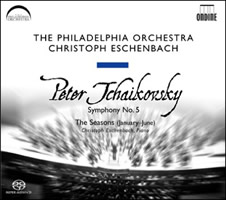|
|
|
| Review by seth May 1, 2006 (8 of 10 found this review helpful)
|
|
Does the catalogue need another recording of the Tchaikovsky 5? Certainly not. There are a plethora of legendary, classic, and just all around good recordings of the symphony available. The Philadelphia Orchestra has recorded the symphony no less than 6 times prior, once per decade since the '40s. But Ondine wants to broaden their image beyond being a clearinghouse for Finnish composers, and apparently some kind of market research has shown that this is the kind of repertoire consumers want to hear Philadelphia perform in its recordings.
Eschenbach's approach to the 5th is to emphasize the contrasts in tempos and dynamics. A lot of people have looked at the timings of this recording and have declared Eschenbach's tempos as slower than most. At times his tempos are unusually slow, but when Tchaikovsky wants something played fast, he takes off at quite a clip. So basically, the slow parts are played slow, and the fast parts fast. There's no straight line. This is not really anything original; Muti does the same thing in his Philadelphia recording, whose timings are longer in all but the second movement. Muti, though, does a better job at masking this. Eschenbach's tempo changes are so pronounced that there is no way you can miss them. At first listen I found this to be rather jarring, but on repeated listens it grew on me. He does the same thing with dynamics. What most impressed me, was how Eschenbach gets the Orchestra to swagger in the various marches, especially the one which begins the coda -- he makes everyone else sound unnecessarily stiff there.
The Orchestra's playing throughout is exquisite. They are the main attraction of this disc.
Instead of the typical Tchaikovsky filler, Eschenbach performs the first half of the "The Seasons" on the piano. Despite how little piano playing he has done in the last two decades, he remains in good form (he will appear as a pianist in future Ondine/Philadelphia recordings). This was my first time hearing "The Seasons," and while charming, I found it a bit lieghtweight (not the caliber of Beethoven, Schubert and Chopin's solo piano music). However, I'll gladly take it over yet another recording of the "Romeo & Juliet" overture or Capriccio Italien. And I would like to hear Eschenbach in the other six seasons.
The sound is what you'd expect from Polyhymnia. Balances and timbres are particularly impressively natural sounding.
If you already own 5ths by Mravinsky, Szell and Muti (Philadelphia), then: Recommended.
|
Was this review helpful to you?
yes |
no
|
|
|
| Review by Daland May 19, 2006 (5 of 9 found this review helpful)
|
|
Sad to say, this recording is an unmitigated disaster. I had hoped for an opportunity to relish the famous Philadelphia sound, but the acoustics are so unflattering, the sound is so opaque and constricted and the performance is so pedestrian that I will hardly ever put this disc in my SACD player again. A veil seems to have been laid over the recording, blurring detail and taking the sheen off the strings. To make matters worse, the sound stage is very narrow, giving the impression of a stereo rather than multi-channel recording even in surround. The piano pieces performed by Eschenbach have fared slightly better, but the acoustics are not very flattering here either.
Interpretatively, Eschenbach never really manages to build tension or excitement as a conductor. He is at best in the lyrical moments such as the horn solo at the beginning of the second movement (superbly played). It is a pity that Ondine have failed to give the Philadelphians the sound they deserve (apparently the sonics of the first SACD were hardly better).
Incidentally, I played the much-maligned LSO recording of Brahms's Fourth Symphony (conducted by Haitink at the Barbican)immediately afterwards. By comparison the sound was nothing short of fantastic - rich, expansive, transparent and detailed. I will gladly buy more recordings done at the Barbican, but will approach any further Ondine recordings with scepticism.
Let us hope that Ondine will find a better recording venue for the Philadelphians in future.
|
Was this review helpful to you?
yes |
no
|
|
|
| Review by stvnharr November 4, 2006 (7 of 9 found this review helpful)
|
|
Well, in distinct contrast to two of the posted reviews, I really liked this recording, in most every way. One really needs another T5 in the way one needs another M6 recording. Thus, I was just not very interested in this recording, and the reviews here were not exactly upbeat. For sa-cd, I've been quite pleased with the Ashkenazy Exton recording that I play with some regularity. But, I dunno, for some reason I just decided to purchase this and give it a go.
Yes, the tempos are slow in places, fast in others, but I never felt anything lagging or dragging, or quickly glossed over. It all seemed to flow quite naturally. It's all different enough from the Ashkenazy to be a nice difference.
The sound on this is something I find to be quite good. Jean-Marie has captured a most wonderfully balanced sound here. Everything is very clean and clear. The orchestra sounds LARGE. To me, the sound bears resemblance to that captured on the finest Rco Live recordings from the Concertgeboux.
Oh, the applause at the end of the symphony - well, if any pause has not been edited out, then the applause started at the exact moment the music ended. It has this loud crescendo of applause followed by a rapid fading out, engineer decision I'm sure. But to me, the applause sounded rather vigorous and joyous, rather the ho-hum implied by PN's review.
It's nice to have half of The Seasons piano transcriptions as fillers here, rather than yet another Romeo and Juliet, Fransesca, or any other the other usual suspects. Perhaps the other 6 pieces of The Seasons will accompany Symphony 6, when it is released.
|
Was this review helpful to you?
yes |
no
|
|
|

